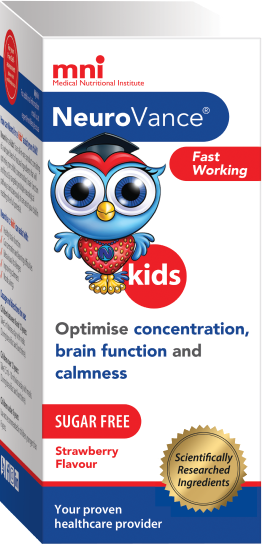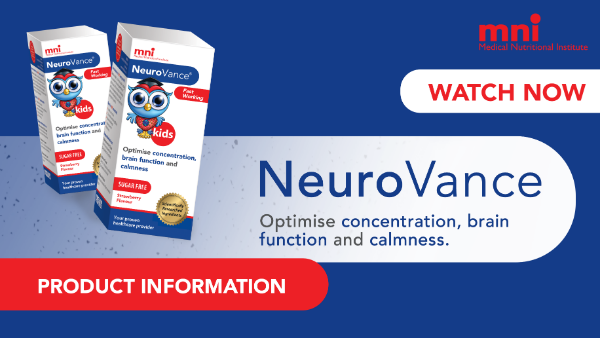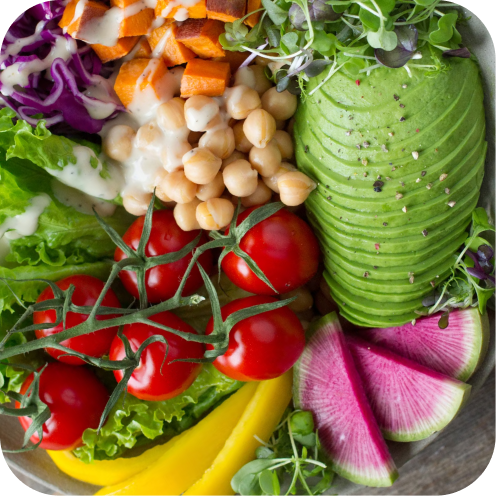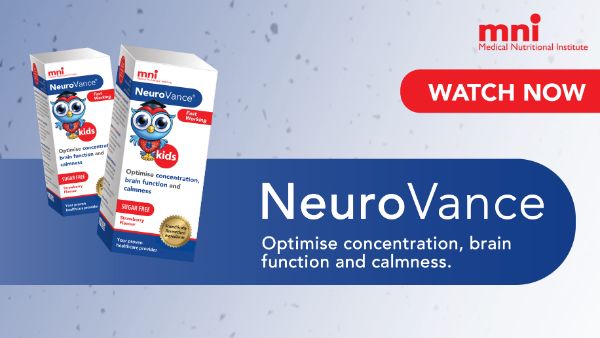Are you a loyal client?
Our regular clientele can enjoy the benefits of free samples by joining the MNI loyalty program



NeuroVance kids syrup contains a blend of plant-derived phytochemical ingredients that will optimse your child’s concentration, brain function and focus during times of stress. By targeting multiple neurological pathways simultaneously, it can assist your child in reaching their full potential without acting as a sedative or stimulant.
NeuroVance kids syrup is fast working.
NeuroVance syrup can assist with:
The individual ingredients contained within NeuroVance syrup are generally considered to have a low side effect profile. Mild gastro-intestinal irritation may occur. Side effects can be minimised by taking NeuroVance syrup with meals. Contact your doctor if you experience any other symptoms.
Yes, NeuroVance syrup may be used in combination with all the above products, except with antidepressant medication that belongs to the class of monoamineoxidase inhibitors [MAOIs]. These are tranylcypromine and moclobemide.
Considering the high demand placed on children today, NeuroVance syrup can help your child to stay focused by increasing brain function and concentration capacity. NeuroVance syrup works fast and is safe for daily use by everyone in the family over the age of 8. Read more about NeuroVance syrup
NeuroVance syrup may be beneficial on an on-going basis as a daily supplement for the whole family, including children over the age of 8. Read more on who can benefit from NeuroVance syrup
NeuroVance syrup can generally be taken in combination with Ritalin or Concerta by children over the age of 8 years. We recommend that you discuss this with your doctor. Read more about NeuroVance syrup drug interactions
NeuroVance syrup has a NAPPI code, which means that most medical aids will pay for it provided that you have a medical aid savings option with available savings. Find out where to get NeuroVance syrup
Yes, NeuroVance syrup is an all-in-one product consisting of a unique blend of natural ingredients that will optimise your child’s concentration, brain function and focus. NeuroVance syrup is sugar free, contains no stimulants and can be used daily by all learners or students over the age of 8. Read more about NeuroVance syrup
NeuroVance syrup is not addictive. Read more about what NeuroVance syrup contains
NeuroVance syrup should not cause sleeplessness as it contains no stimulants. It is however recommended that NeuroVance not be taken after 5 pm if insomnia poses a problem. Read more about NeuroVance syrup special precautions
NeuroVance syrup is unlikely to make your child drowsy as it does not suppress the central nervous system.
Read more about NeuroVance
NeuroVance kids syrup contains a blend of plant-derived phytochemical ingredients that will optimise your child’s concentration, brain function and focus during times of stress. By targeting multiple neurological pathways simultaneously, it can assist your child in reaching their full potential without acting as a sedative or stimulant.
NeuroVance kids syrup is fast working.
NeuroVance kids is an all-in-one product consisting of a unique blend of plant-derived phytochemical ingredients that will optimise your child’s concentration, brain function and focus. By targeting multiple neurological pathways simultaneously, it can assist your child in reaching their full potential.
NeuroVance Syrup can assist with:
NeuroVance kids contains a unique blend of plant-derived phytochemical ingredients that have the potential to support healthy brain function. Its multi-modal pharmaceutical action enhances separate but interconnected components of brain function, thereby giving you or your child’s brain a physiological advantage during demanding and stressful periods. The ingredients contained in NeuroVance syrup are roseroot extract, inositol, magnesium oxide and zinc sulphate. NeuroVance syrup is sugar free.
Roseroot (Rhodiola rosea) is a plant that grows at high altitudes in the arctic regions of Europe and Asia. Extracts of the roots have been used in Scandinavian and European countries as part of traditional Western medicine to combat fatigue, reduce the effects of stress and to aid with recovery during illness.
Inositol is a natural carbohydrate present in a variety of foods. The highest concentrations are naturally found in fruits, especially cantaloupe and oranges, and in some beans, grains and nuts. Various scientific studies on inositol supplementation have demonstrated therapeutic efficacy regarding emotional wellbeing and stress reduction.
Magnesium is a biologically essential trace element which plays a dominant role in the regulatory activity of over 300 enzymatic processes involved in optimal brain function, including nerve conduction and the production of neurotransmitters.
Zinc is a crucial micro-nutrient and co-factor in many biological processes including DNA, RNA and protein synthesis. Zinc also plays a key role in various mental functions such as behaviour and learning.
One 5 ml contains:
| Ingredients | |
|---|---|
| Inositol | 380mg |
| Roseroot extract (Rhodiola rosea) | 100mg |
| Magnesium | 33mg |
| Zinc Sulfate | 7.5mg |
Free from: Sucrose, Lactose, Gluten and Tartrazine.
Inactive ingredients: Purified water, citric acid, strawberry flavour, non-nutritive sweetener (sodium cyclamate, acesulfame k), strawberry colourant, xanthan gum, glycerin, sorbitol (70%), hydrochloric acid (34%) and preservatives (potassium sorbate, sodium benzoate).
Anyone suffering from mental exhaustion, concentration or behavioural issues can benefit from NeuroVance Syrup. It is ideal for exams, balancing extra-mural activities with schoolwork or children who find it difficult to remain calm and focussed. NeuroVance Syrup can also be used as a daily supplement to help you or your child reach peak mental performance.
Children between 8 and 12 years: Take 5 ml twice a day with meals (during breakfast and lunchtime).
Children over 12 years: Take 7,5 ml – 10 ml twice a day with meals (during breakfast and lunchtime).
Adults: Take 10 ml twice a day with meals (during breakfast and lunchtime).
Children under 8 years: Use not recommended in children younger than 8 years.
NeuroVance Syrup should not be used if you:
The individual ingredients contained within NeuroVance Syrup are generally considered to have a low side effect profile. Mild gastro-intestinal irritation may occur. NeuroVance Syrup is non-stimulatory and non-sedative.
Yes, NeuroVance Syrup may be used in combination with all the above products, except antidepressant medication that belongs to the class of monoamine oxidase inhibitors [MAOIs] such as tranylcypromine and moclobemide. Consult your doctor if you are unsure about combining NeuroVance Syrup with your medication.
NeuroVance Syrup contains a unique blend of plant-derived phytochemical ingredients that aid with the regulation of mood and concentration under stressful conditions. These are roseroot extract, inositol, magnesium and zinc.
Roseroot extract
Roseroot (Rhodiola rosea), also known as “arctic root” or “golden root”, is a perennial plant that grows at high altitudes in the arctic regions of Europe and Asia. Extracts of the rhizomes and roots have been used in traditional Western medicine in Scandinavian and European countries to combat fatigue, reduce the effects of stress and to aid convalescence during illness. Roseroot extract has a long history of documented use and appears in the Materia Medica of several European countries. During the early 19th century in France it was recommended as a “brain tonic” in literature. In the Swedish Drug and Therapy Handbook (Lakemedelsboken 1997/98), roseroot extract is classified as one of the most commonly-used herbal neuro-adaptogens in Sweden. Preparations containing roseroot extract are typically used to increase concentration and enhance mental performance during times of emotional and physical hardship.
Roseroot extract contains various chemical classes including flavonoids, phenolic acids, phenylethanol derivatives (salidroside and tyrosol) and phenylpropanoid glycosides (rosiridin, rosin, rosavin and rosarin). In vitro studies have demonstrated that rosiridin potently inhibits the action of both monoamine oxidase A and B, two key enzymes responsible for the degradation of monoamine neurotransmitters such as serotonin, noradrenaline and dopamine. It has therefore been proposed that a possible mechanism of action explaining roseroot extract’s effect could potentially be linked to its ability to influence levels of certain mood-regulating neurotransmitters in the brain (Dierman et al. 2009).
Several studies have examined the influence of roseroot extract in relation to symptoms of mental and physical fatigue under stressful conditions. A randomised, double blind, placebo-controlled trial evaluated the effects in subjects suffering from stress-related fatigue by measuring salivary cortisol levels in addition to performing various psychometric stress and cognitive assessments. Cortisol is a known stress hormone and is involved in the regulatory mechanism of the stress response. Subjecting animals and humans to chronic stress produces characteristic changes in the hypothalamic-pituitary-adrenal axis (HPA), including an increase in the level of cortisol and a reduction in the sensitivity of the HPA to feedback inhibition. The hyper-secretion of cortisol may under certain conditions be considered a potential marker to indicate increased stress levels. In this study, the post treatment cortisol response to awakening was significantly reduced in subjects who had received roseroot extract for a period of 28 days, as compared to the placebo-control group (n=60). Several psychometric tests conducted on the same subjects demonstrated a substantial reduction in fatigue-related symptoms and an improvement of various cognitive indicators associated with psychological stress (Olsson et al. 2008). Three double-blind, placebo-controlled studies have also evaluated the effects of roseroot extract in relation to mental performance on subjects that were exposed to increased levels of stress (N total =250). Endpoints included mental work capacity, as measured by various cognitive assessment models. In all trials, mental performance against a background of fatigue caused by stress was significantly improved when compared to a placebo control group (Spasov et al. 2000, Darbinyan et al. 2002, Shevtsov et al. 2003). Two double-blind, placebo-controlled studies evaluated the effects of roseroot extract on subjects in relation to measurable mood disturbances as determined by DSM – IV criteria, namely generalised anxiety disorder (GAD) and mild to moderate depression (N total = 99). In both studies, statistically significant differences were reported in various depression and anxiety scale scores in subjects taking roseroot extract as compared to the placebo control group (Bystritsky et al. 2008, Darbinyan et al. 2000).
Inositol
Inositol (C6H12O6) is a natural isomer of glucose and is present in a variety of foods. The highest concentrations are found naturally in fruits, especially cantaloupe and oranges, and as a component of phosphates or phospholipids in beans, grains and nuts. Inositol occurs in 9 different stereo-isomeric forms, with myo-inositol being the most dominant and widely distributed in nature. Inositol is a key metabolic precursor in the phosphoinositide (PI) cycle, a second messenger linked to norepinephrine, serotonin and other receptors thought to be involved in affective and anxiety disorders. Dietary inositol is incorporated into neuronal cell membranes as inositol phospholipids where it serves as a key metabolic precursor to several subtypes of adrenergic, cholinergic, serotonergic and metabotropic neuro-receptors in the brain. Behavioural and biochemical studies indicate that inositol lipids have the potential to alter receptor sensitivity, direct membrane trafficking events and modulate signalling proteins (Harvey et al. 2002). Various scientific studies on inositol supplementation have also demonstrated therapeutic efficacy regarding emotional wellbeing and stress reduction. These include three separate double-blind, placebo-controlled studies, published in the American Journal of Psychiatry, illustrating an improvement superior to placebo of symptoms associated with panic disorder, depression and obsessive-compulsive disorder (Benjamin et al. 1995, Levine et al. 1995, Fux et al. 1996). Another double-blind, crossover study found high dose inositol supplementation equal to that of fluvoxamine in reducing symptoms of panic disorder (Palatnik et al. 2001).
Magnesium
Magnesium is a biologically essential trace element which plays a dominant role in the regulatory activity of over 300 enzymes involved in optimal nerve conduction, the production of neurotransmitters and the synthesis of ATP, DNA, and RNA.
Zinc
Zinc is a biologically essential trace element and co-factor in many biological processes including DNA, RNA and protein synthesis. Zinc also plays a key role in various mental functions such as behaviour and learning.


Our multidisciplinary panel offers combined medical expertise with a holistic and medical approach to all your questions
I would just like to say thank you for your the awesome Nurovance Kids Syrup that my triplet boys are taking. It has made such a difference in our lives and theirs, they are able to concentrate so much better in school and over all are so much happier kiddies.Thank you so much!
It’s now my 2nd year that I use it for my child. She used it after winning a competition – received it as a gift. From that time on, I buy it all the time. Friday I bought 1 again because the school is going to begin soon. I must say, it helps my child a lot.
It is truly an excellent product. My daughter has been using it since the beginning of her schooling. It has become part of her vitamin routine in the mornings.
Grade 1 is a thriller for most parents. Same for this mom and dad. Not only did our daughter struggle to adjust to the routine of going to school and doing homework, she also started having terrible night terrors. And believe me it was awful…. More for us than her apparently. But I started giving NeuroVance syrup for kids to her and I could very quickly see a big difference in her mood towards school as well as her sleep pattern. She started sleeping again and was also calmer to go to school in the mornings. Thanks MNI-
My child was struggling at school and a teacher recommended NeuroVance. I am happy to say that we have seen such a drastic improvement in his overall behaviour and grades!

Free Healthy Meal Plans For Weight Loss, Insulin Resistance & More.
Diet has a key role in your health and wellbeing. We have developed scientifically grounded meal plans for various aspects of the Metabolic Syndrome that will suit both your taste and wallet.

Use our assessment to help identify possible solutions to improve wellbeing. We encourage you to discuss the results of these assessments with your medical doctor

Best results are achieved when a variety of strategies are implemented simultaneously. Use our exercise programmes to help you manage and prevent various diseases.

Free Healthy Meal Plans For Weight Loss, Insulin Resistance & More.
Diet has a key role in your health and wellbeing. We have developed scientifically grounded meal plans for various aspects of the Metabolic Syndrome that will suit both your taste and wallet.

Use our assessment to help identify possible solutions to improve wellbeing. We encourage you to discuss the results of these assessments with your medical doctor

Best results are achieved when a variety of strategies are implemented simultaneously. Use our exercise programmes to help you manage and prevent various diseases.
Receive a 10% discount when you place an auto renew order for your convenience.



Trusted by Wimgo